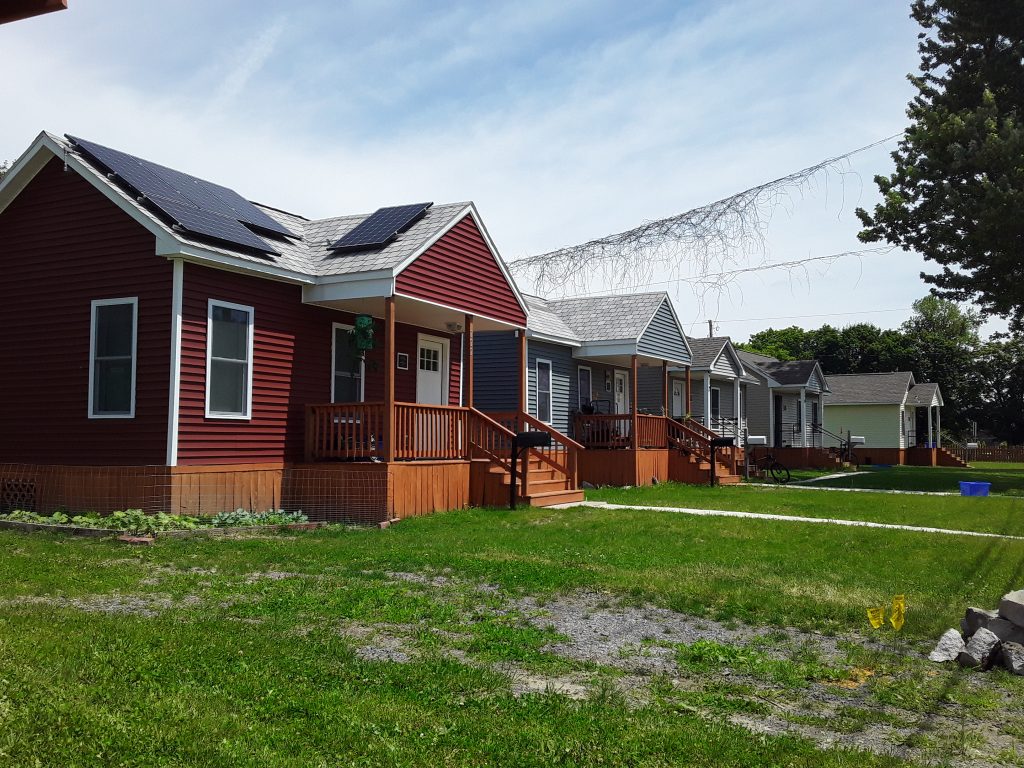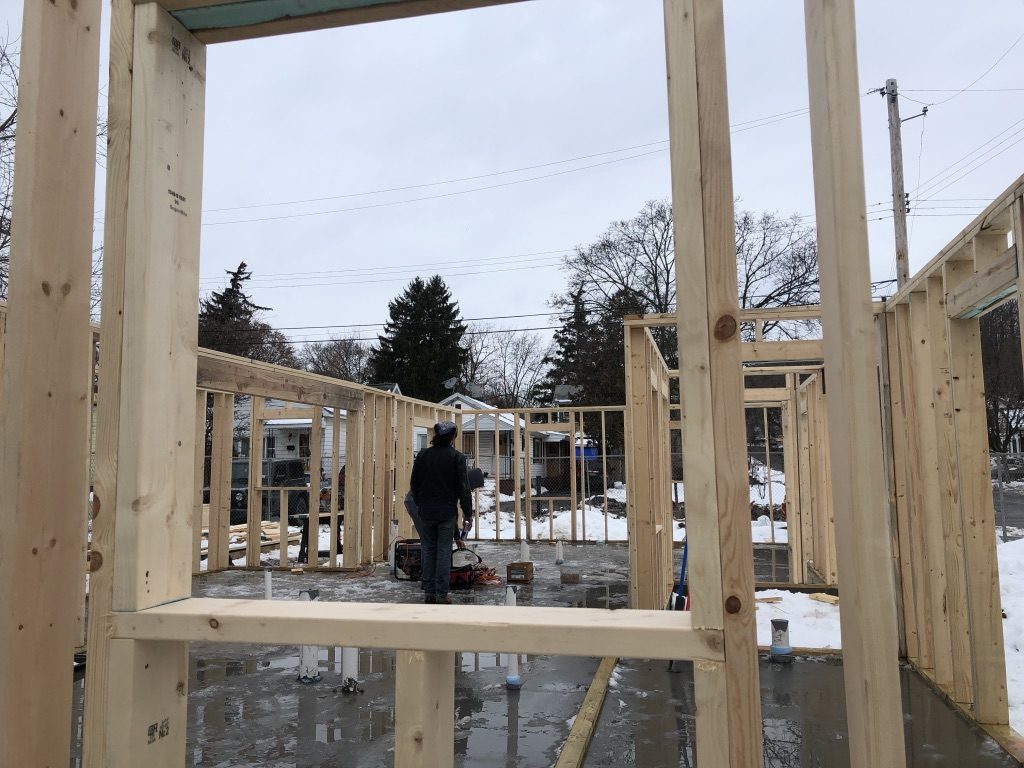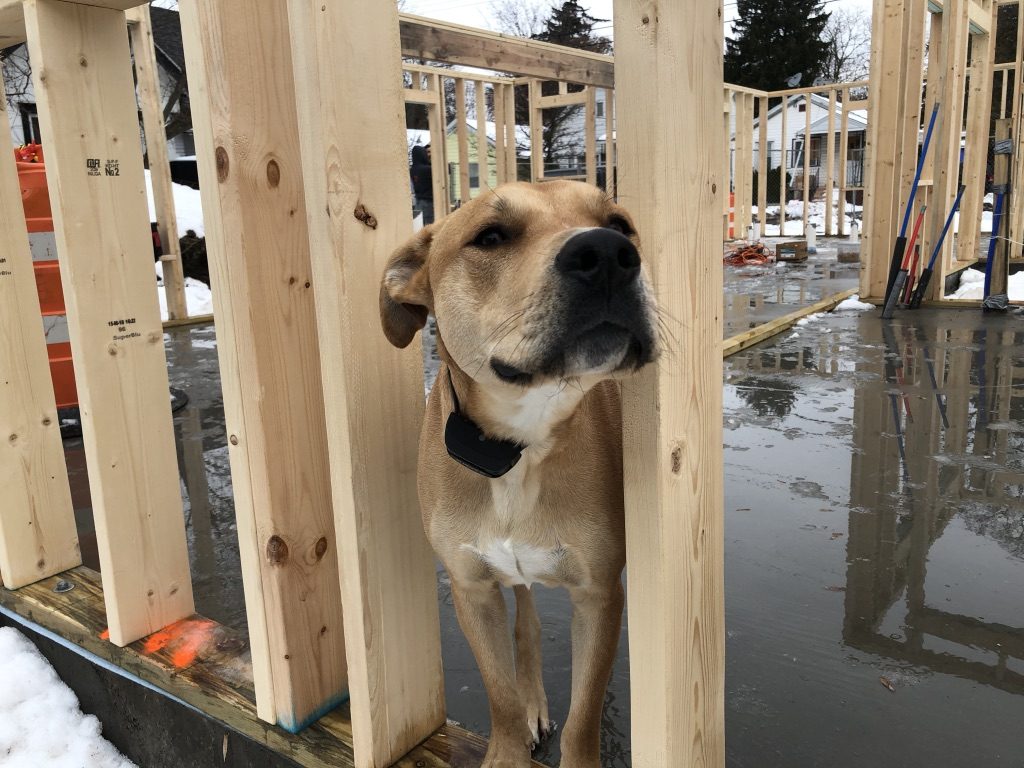A Tiny Home for Good builds affordable houses for the homeless
A Tiny Home for Good builds affordable housing

Andrew Lunetta has too many keys.
He stores them in a plastic Tupperware box in the center console of his white pick-up truck, in case he ever needs to go into one of the tiny, affordable homes he’s built in Syracuse.
“Something I didn’t anticipate was the activity of being a landlord,” said Lunetta, the executive director of A Tiny Home for Good. “That’s a piece of this job that I really don’t like but that I think is really important – having a landlord who cares about the tenant living there.”
When Lunetta started A Tiny Home for Good in 2015, he didn’t expect to be both the landlord and in charge of construction, he said, but his many roles give him the opportunity to connect with the tenants and allow him to expand his non-profit.
He is currently completing a three-unit home, which will bring the organization’s unit total to 21. The homes are approximately 300 square feet, fully furnished and also include toiletries, utensils, pots and pans, he said.
While studying at Le Moyne College and pursuing a master’s degree in public administration at Syracuse University, he volunteered at a men’s shelter, where he saw a need for better housing. He said people would leave the shelters and be placed in insufficient housing conditions.
“Men would inevitably make their way back to the shelter because the housing they moved into was so terrible,” he said. “I started asking guys what they wanted and they kind of described a tiny home. Just like their own bedroom, their own bathroom, their own four walls.”
What the men described was a tiny home of their own, Lunetta said, and he created A Tiny Home for Good, which builds small and affordable homes to provide shelter and comfort to people facing homelessness in the area.
With his degrees, he said, he could have moved to Washington D.C. and found a “good job,” but none of those jobs excited him the way non-profit work did.
But what seemed like an easy task, proved to be much harder, he said, because he didn’t have knowledge of the technicalities that creating a non-profit entails, like getting the organization off the ground.
He went to churches, meetings and anywhere people would listen to him to share the message of A Tiny Home for Good, he said. He added that he was under the impression that the county or city would donate money, but they required that Lunetta get approval from the neighborhood he wanted to build in.
But there was no neighborhood that would approve.
“They were really terrible meetings where people were talking about how they didn’t want drug addicts or drunks or the mentally ill in their neighborhoods and it went south,” he said.
For the first year and a half, Lunetta had the organization and the money, but no land to build on.
He said he realized the opposition he faced was a result of not sharing the full message.
“I kept on using the word ‘homeless’ and ‘individuals facing homelessness’ and never really brought up the fact that we’d be renting to veteran,” he said.
He saw it as an opportunity to “get their foot in the door” with neighborhoods, which allowed the possibility of renting to more than just veterans in the future. Now, they rent to anyone who faces homelessness and maintain that half of their housing is for veterans.

He’s noticed that attitudes have changed over time, he said, and have received money from the county and land from the city. He said the neighbors’ fears of the tenants stemmed from the desire to keep their neighborhoods’ appearance pristine.
“All they want to be sure, is that the outside looks nice and that there aren’t tons of cars doing drug deals or whatever,” he said. “So how someone spends time inside their house I don’t think is nearly as important to the neighbors.”
He knocks on doors regularly to check in on tenants and neighbors, as well as tending to the appearance of the tiny homes, like painting, fixing windows and mowing lawns, he said.
The first piece of land he purchased was on the south side of Syracuse on Rose Avenue, where he happened upon a landlord who was willing to sell their land to him.
In retrospect, he said, he would have more carefully considered the location of the homes, because he didn’t consider the proximity to bus lines, laundromats, grocery stores or otherwise. Now, most units have laundry machines and are nearby amenities tenants might need.
He also chooses quieter streets to build on, where there is less commotion, he said, and it’s seen more success.
“The men and women that we rent to for so long have been in living situations that are chaotic, that have tons of different people that are facing similar mental health challenges or drug addictions,” he said. “When you’re around that chaos or lots of traffic, and things like that, it can tempt you into being a part of that life again.”
While building the first units on Rose Avenue, it was harder than Lunetta or any of his coworkers expected. No one on the team knew much about construction, said Robert Dougherty, a long-time volunteer who was a city councilor prior to retirement. There’s nothing in the city codes about tiny homes, he added, which made it harder for the team to navigate technicalities.
“He was looking on YouTube all the time to figure out how to do this stuff,” he said of Lunetta. “The reason this has worked out is because he’s just willing to try stuff.”
It’s Lunetta’s “we can do it” attitude that kept the organization going, Dougherty said, because he is always open to tackle something new. His diligence is contagious, Dougherty added, and inspires the rest of the team.

It was on that same construction site that Lunetta also found his furry companion: Brady, his dog.
Now two years old, Lunetta found Brady as a six-month-old stray on the streets and took the dog home. Despite the difficulties that having a puppy raised – like the constant barking and need for attention, he said – he kept the dog.
“I thought every day was a mistake just getting him,” Lunetta said, with a laugh.
Now, Brady rides along with Lunetta in the backseat of his truck and runs freely off his leash, sniffing around the various construction sites and keeping Lunetta company.
Since the first homes on Rose Avenue, A Tiny Home for Good has been successful, said Lunetta.
He defines success, not just based on how many homes he’s built, but the fact that he’s provided shelter for people who need it, he said. But that doesn’t mean the tenants won’t relapse into old habits, he said.
“It means they’re in a safe space where they can do something productive,” he said, “and that’s what success is in my eyes.”
Now, there are 50 people on the waitlist for housing, and the organization is building more tiny homes on the north side of Syracuse, a part of the city that was previously uncharted for the organization.
Lunetta said he believes spreading the homes across the city is more beneficial than clumping them in one development, because the houses are assimilated into various neighborhoods.
“Instead of it being this place where the previously homeless people live, now it’s just a cute house in a neighborhood,” he said. “It does a lot to spread it apart and not just have it be this tiny home village.”
To the team, this organization is more than just providing homes, it creates connections and improves the individuals’ lives, said Jules Wellner, the project manager of A Tiny Home for Good.
“I think it gives people a community,” he said. “It’s not just giving them a house, we stay in contact with them.”
Lunetta said he knows every tenant by name, stopping by to see them when he knows they’re sick or need help. He wants to provide support for the tenants who might not have otherwise had it, especially those with mental health challenges who are caught in the shelter system cycle, he said.
“This world is just not built for them,” he said. “We’re trying to provide them with a space that is set up just for them.”





